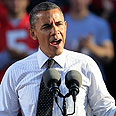
Overcoming Obama’s foreign policy
Op-ed: Candidate who sets clear red line for Iran should get majority of American vote
America’s economy can overcome four more years under Obama. The recovery will take longer, perhaps two or three extra years, but American values, work ethics and innovation will eventually overcome Obama’s regulations, big government and excessive spending. These virtues however will not be enough to overcome foreign policy fumbles in general and a nuclear Iran in particular. With the final presidential debate fast approaching, that is the issue of the day.
Since taking office, Obama has applied a bewildered foreign policy that has weakened America’s global stature and political leverage in every corner of the world. Aside from an unmerited Nobel Peace Prize, the president did not have a single international achievement to note. Not with the Chinese currency crisis or with the Russian reset, not with Latin American immigration issues or with ignored Africa. His failure in the Middle East however, is the most disappointing. Starting with a detached speech in Cairo, thru Tunis and now the indifference to the civilian bloodshed in Syria, the administration has made the wrong call on almost every Arab Spring opportunity.
Most significantly, with the Iranian nuclear crisis, President Obama has opted for a failed policy limited to negotiations and economic sanctions. Four rounds of international negotiations between Iran and Britain, China, France, Russia, the EU and the United States in Istanbul, Baghdad and Moscow have resulted in nothing aside from buying Iran more time to further develop its nuclear capabilities.
While it is true that sanctions have hurt Iran's economy - about 45 billion dollars in gas export damage, hyperinflation of 25% and close to 80% devaluation of the country's currency compared to the dollar - they have not slowed down Iran's nuclear program. On the contrary: divestment will eventually diversify the Iranian economy and sanctions alone actually serve as a stimulus for the ayatollahs and Ahmadinejad, who stress that a nuclear Iran will be able to blackmail the West and nullify any significant sanctions.
Roger Fisher, the late Harvard negotiations guru taught generations of leaders, including Barak Obama, that every successful negotiator needs to set a best alternative to a negotiated agreement (BATNA). A red line needs to be drawn, and if crossed other means need to be applied.
Such lines were recently drawn by Benjamin Netanyahu at the UN. Sanctions need to be backed by clear and credible red lines. Red lines set by Kennedy in 1962 prevented a nuclear confrontation in Cuba, when set by NATO throughout the cold war, they prevented war in Europe and they have even worked with Iran in the recent Strait of Hormuz crisis. Clear and credible red lines will not instigate war - they may very well prevent one. Such a red line should be set by the United States and all other nations who truly understand the Iranian threat. Canada, for one, can be counted on. For some unclear reason Obama refuses to draw the line. If not from Israel, perhaps President Obama will take heed from his friendly neighbor to the north.
In 2012, the presidential candidate who sets a clear and credible red line to Iran (perhaps in the final debate) should receive the majority of the American vote. If the current President continues to appease rather than confront Iran, the American voter should help Romney overcome Obama.










